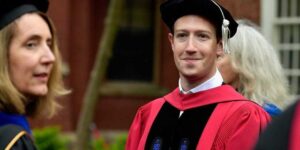
“Who you spend time with in college is the most important decision any student can make on campus,” Mark Zuckerberg has said.
He said this while speaking On a recent episode of the “Lex Fridman Podcast,” hosted by Massachusetts Institute of Technology IT computer scientist Lex Fridman.
While recounting his campus experience at Harvard University, the Facebook chief executive officer said that “You become the people you surround yourself with.”
Zuckerberg met his Facebook co-founders: Eduardo Saverin, Dustin Moskovitz, Chris Hughes and Andrew McCollum, while the five were students at Harvard University in the early 2000s. In 2004, they together founded Facebook, the world’s leading social media platform, that boasts over two billion users.
The 37-year-old further advised that in addition to students being objective in their college study, they should be keen to build connections with other people.
He said that people should not entirely look at his University story from the dropping out angle, saying that that makes them miss out on the bigger picture.
Zuckerberg said his original ability to launch Facebook back in 2004 wasn’t because he dropped out of college or abandoned any of his other interests. Rather, the Meta CEO said, it was due to the connections he made while he was still in school.
The Facebook platform which he built with the help of the four others went on to revolutionise social media and become one of the world’s largest companies. Meta has a market capitalization of $582.58 billion.
The group eventually split up in an infamously messy fashion, but Zuckerberg said on the podcast that he still tries to prioritize relationships over objectives today. That applies particularly to hiring. He said that for example, when hiring a candidate, he puts himself in their shoes, and sees himself as working for them rather than him being their boss.
That way, Zuckerberg said, he creates a work environment that’s both more cohesive and more productive as it enables him to get people who share his values on a human level.
It’s all about finding personal compatibility, he said, not unlike “choosing friends or a partner.”
Zuckerberg’s prioritisation of relationships over objectives could also help elucidate a few of Zuckerberg’s more contentious decisions at Meta’s helm. For example, in a leaked 2016 memo first surfaced by Hacker News, Zuckerberg defended then-board member Peter Thiel, a major supporter of Donald Trump’s 2016 presidential campaign.
Zuckerberg wrote that keeping Thiel on the board was more important than any perceived blowback the company might receive, arguing that Facebook “can’t create a culture that says it cares about diversity and then excludes almost half the country because they back a political candidate.”
The move may have had consequences. Many of Zuckerberg’s critics believe his allegiance to Thiel, an early Facebook investor, may have affected how Facebook monitored — or ignored — misinformation on the social media platform leading up to the 2016 and 2020 elections.
In 2019, a Wall Street Journal investigation revealed that Thiel was among those who pressured Zuckerberg to not fact-check political ads on his platform. That year, three longtime board members left the company. Both Democrat and Republican lawmakers have since criticized how Facebook manages content on its platform.



